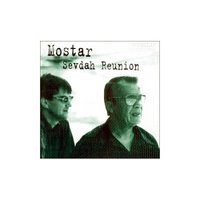+UP.jpg) O Ensemble Recherche interpreta sete composições para cinema de Morton Feldman, datadas entre 1950 e 1981
O Ensemble Recherche interpreta sete composições para cinema de Morton Feldman, datadas entre 1950 e 19810 1 2 - post by: kriska - @
por entre os sons da música, ao ouvido como a uma porta que ficou entreaberta... (virgilio ferreira)


 Apesar de todo o sucesso e mediatização os White Stripes mantém-se fiéis a si próprios
Apesar de todo o sucesso e mediatização os White Stripes mantém-se fiéis a si próprios O Maghreb é Berbère, Árabe mas também e sobretudo Africano.
O Maghreb é Berbère, Árabe mas também e sobretudo Africano. Rosa is the debut CD by Amira {Amira Medunjanin}, a young singer from Sarajevo. Bosnia & Herzegovina's own song form is as emotionally potent as Portuguese fado, Greek rebetika or the blues. It’s called sevdah. Its songs – sevdalinka – are almost always erotic & tragic. Amira’s skill & passion {indeed, the very existence of a credible, young singer of sevdalinka} have amazed her compatriots, not least her initially sceptical accompanists, including accordion & clarinet virtuoso Mustafa Šantic. Many generations of troubled history inform the sevdalinka, which still address current realities. As with ‘duende’, so with ‘sevdah’: there’s no direct English translation. ‘Yearning’ is perhaps the best single word. The CD was recorded in Mostar.
Rosa is the debut CD by Amira {Amira Medunjanin}, a young singer from Sarajevo. Bosnia & Herzegovina's own song form is as emotionally potent as Portuguese fado, Greek rebetika or the blues. It’s called sevdah. Its songs – sevdalinka – are almost always erotic & tragic. Amira’s skill & passion {indeed, the very existence of a credible, young singer of sevdalinka} have amazed her compatriots, not least her initially sceptical accompanists, including accordion & clarinet virtuoso Mustafa Šantic. Many generations of troubled history inform the sevdalinka, which still address current realities. As with ‘duende’, so with ‘sevdah’: there’s no direct English translation. ‘Yearning’ is perhaps the best single word. The CD was recorded in Mostar.
 During the Bosnian war, musicians in Mostar met by candlelight to quietly perform the bluesy Turkish-influenced café songs called sevdah. After the war, vocalist Illijaz Delic, accordionist Mustafa Santic, and other musicians recreated the spirit of the wartime concerts for Sevdah Reunion. The sevdah genre mines the deepest human emotions, holding nothing back in its examination of the terrible beauty of life. There is a mysterious intensity to almost every note, turning even a song about shoeing horses by moonlight ("Mujo Kuje Konje Mjescu") into an enigma of great emotional force. Pile-driver of a love song, "Dul Zulejha" (Zuleiha the Rose) swells with inexplicable urgency. Its lyrics about the morning wanderings of a country girl seem out of proportion to the militant tempo and almost unbearable tension of the thumping accordion, bass, and drum arrangement. The belly-dance rhythm of the faster songs lightens the mood with violin solos that suggest the fire of Balkan gypsy songs. On "Moj Dilbere," "queen of the gypsies" Esma Redzepova takes a whip-crack dance rhythm as her own, trading verses with Delic with passion and ribald underpinnings matched by braying reeds. The strictly local flavor can occasionally make Sevdah Reunion a little difficult to penetrate. But the lack of concessions to an international audience gives this superbly performed disc an undiluted power to enthrall. Bob Tarte
During the Bosnian war, musicians in Mostar met by candlelight to quietly perform the bluesy Turkish-influenced café songs called sevdah. After the war, vocalist Illijaz Delic, accordionist Mustafa Santic, and other musicians recreated the spirit of the wartime concerts for Sevdah Reunion. The sevdah genre mines the deepest human emotions, holding nothing back in its examination of the terrible beauty of life. There is a mysterious intensity to almost every note, turning even a song about shoeing horses by moonlight ("Mujo Kuje Konje Mjescu") into an enigma of great emotional force. Pile-driver of a love song, "Dul Zulejha" (Zuleiha the Rose) swells with inexplicable urgency. Its lyrics about the morning wanderings of a country girl seem out of proportion to the militant tempo and almost unbearable tension of the thumping accordion, bass, and drum arrangement. The belly-dance rhythm of the faster songs lightens the mood with violin solos that suggest the fire of Balkan gypsy songs. On "Moj Dilbere," "queen of the gypsies" Esma Redzepova takes a whip-crack dance rhythm as her own, trading verses with Delic with passion and ribald underpinnings matched by braying reeds. The strictly local flavor can occasionally make Sevdah Reunion a little difficult to penetrate. But the lack of concessions to an international audience gives this superbly performed disc an undiluted power to enthrall. Bob Tarte